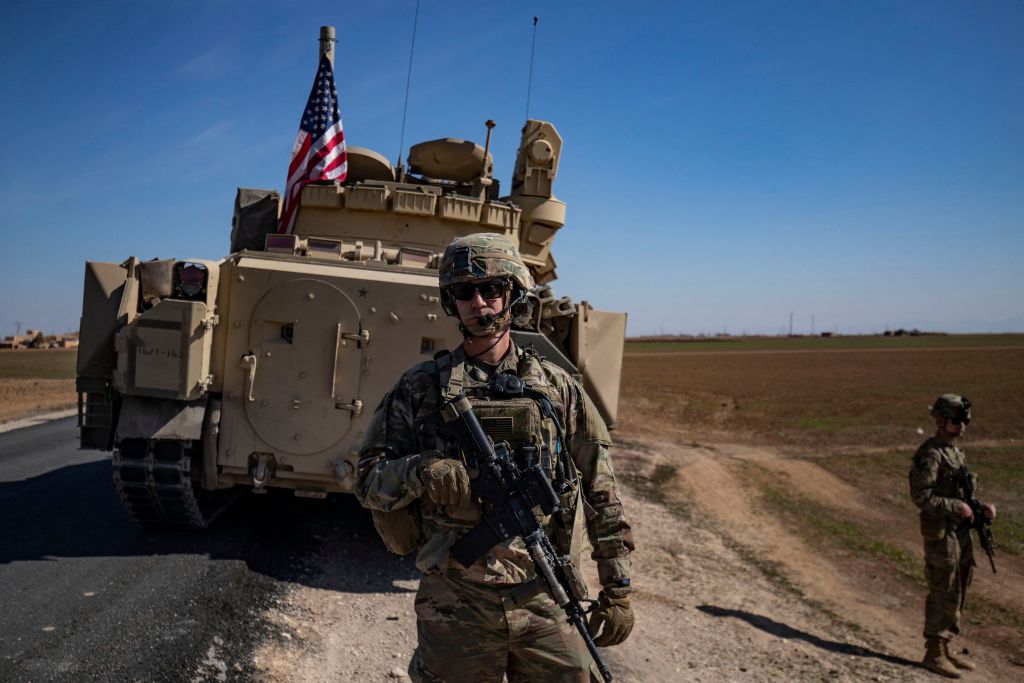War can never be 'humane'


A free daily email with the biggest news stories of the day – and the best features from TheWeek.com
You are now subscribed
Your newsletter sign-up was successful
There is no such thing as a "humane" war, much as we might want there to be. The New York Times on Sunday published an exposé of a U.S. military unit called "Talon Anvil," which was reportedly quite effective at fighting ISIS in Syria — but achieved that distinction by playing fast and loose with rules designed to minimize civilian deaths.
In its efforts to destroy the terrorist group, Talon Anvil "circumvented rules imposed to protect noncombatants, and alarmed its partners in the military and the C.I.A. by killing people who had no role in the conflict: farmers trying to harvest, children in the street, families fleeing fighting, and villagers sheltering in buildings," the paper reported.
The unit "made a lot of bad strikes," one former Air Force officer said. Which is a nice way of saying that U.S. forces routinely slaughtered innocents.
The Week
Escape your echo chamber. Get the facts behind the news, plus analysis from multiple perspectives.

Sign up for The Week's Free Newsletters
From our morning news briefing to a weekly Good News Newsletter, get the best of The Week delivered directly to your inbox.
From our morning news briefing to a weekly Good News Newsletter, get the best of The Week delivered directly to your inbox.
Since the emergence of "smart bomb" weaponry during the first Gulf War three decades ago — and especially since drone strikes became a tool against suspected terrorists and even U.S. citizens under President Obama — the American government and its allies have tried to convince the public that they can and do inflict fearsome destruction on their enemies, but with a rigor that allows them to largely avoid causing injury and death to bystanders.
It's never really worked out that way: U.S. forces have repeatedly bombed civilian facilities over the last three decades, often with horrifying results. More than 400 Iraqis died after their air raid shelter was hit by two laser-guided bombs in 1991, while more than 40 died during a 2015 attack on a Doctors Without Borders hospital in Afghanistan. More recently, an Afghanistan family was wiped out by an August drone strike during the panicked American withdrawal from that country. These are just the examples that have drawn widespread attention: The Pentagon has a reputation for undercounting civilian deaths, but hundreds of thousands of civilians have probably died as a result of American wars in Iraq and Afghanistan.
The tech might be rigorous, but the people who push the buttons are often sloppier — often intentionally. The Times reports that Talon Anvil circumvented U.S. rules of engagement by using expansive definitions of "self-defense" to justify their strikes. (The unit also apparently started directing drone cameras away from targets, seemingly in order to avoid documenting possible violations of the rules.) If that's true, those low-level operators were just following the example of leaders like Obama who allowed fuzzy regulations to put a nice face on ugly results.
Yale historian Samuel Moyn has provoked controversy recently by suggesting that the promise of "humane" wars lets the United States go to war more often, with less objection from the public. It's a false promise. Warfighting kills people, civilians, and soldiers, and leaves its survivors shattered. Nothing can change that. The Talon Anvil story is just a new reminder of a very old truth.
A free daily email with the biggest news stories of the day – and the best features from TheWeek.com
Joel Mathis is a writer with 30 years of newspaper and online journalism experience. His work also regularly appears in National Geographic and The Kansas City Star. His awards include best online commentary at the Online News Association and (twice) at the City and Regional Magazine Association.
-
 Why is the Trump administration talking about ‘Western civilization’?
Why is the Trump administration talking about ‘Western civilization’?Talking Points Rubio says Europe, US bonded by religion and ancestry
-
 Quentin Deranque: a student’s death energizes the French far right
Quentin Deranque: a student’s death energizes the French far rightIN THE SPOTLIGHT Reactions to the violent killing of an ultraconservative activist offer a glimpse at the culture wars roiling France ahead of next year’s elections
-
 Secured vs. unsecured loans: how do they differ and which is better?
Secured vs. unsecured loans: how do they differ and which is better?the explainer They are distinguished by the level of risk and the inclusion of collateral
-
 Russia and Iran 'up the ante' after meeting in Turkmenistan
Russia and Iran 'up the ante' after meeting in TurkmenistanThe Explainer Two nations talk up their closer ties but some in Tehran believe Putin 'still owes' them
-
 Iran and Israel: is all-out war inevitable?
Iran and Israel: is all-out war inevitable?Talking Points Tehran has vowed revenge for assassinations of Hamas and Hezbollah leaders, but Gaza ceasefire could offer way out
-
 Will Iran risk all-out war with Israel?
Will Iran risk all-out war with Israel?Today's Big Question Tehran has not wanted to be directly involved in the Middle East conflict so far. But that could be about to change
-
 Grant Shapps goes to war on military's 'woke' diversity policies
Grant Shapps goes to war on military's 'woke' diversity policiesTalking Point Defence secretary condemns 'extremist culture' as Army reportedly plans to relax security checks on overseas recruits
-
 Turkey claims death of 3rd ISIS leader in 2 years
Turkey claims death of 3rd ISIS leader in 2 yearsSpeed Read
-
 The deadly attacks on Syrian truffle hunters
The deadly attacks on Syrian truffle huntersfeature Islamic State suspected of targeting Syrians risking their lives to secure much-needed income
-
 U.S. strikes Iranian-linked targets in Syria after drone attack kills 1 U.S. contractor, wounds 6 others
U.S. strikes Iranian-linked targets in Syria after drone attack kills 1 U.S. contractor, wounds 6 othersSpeed Read
-
 Kansas woman sentenced to 20 years for leading Islamic State battalion
Kansas woman sentenced to 20 years for leading Islamic State battalionSpeed Read
